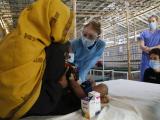Feb 5, 2003 (CIDRAP News) – Close to 200,000 doses of smallpox vaccine have been shipped to 35 states and two major cities since the vaccination program began Jan 24, but only about 700 healthcare workers have been vaccinated so far, according to the Centers for Disease Control and Prevention (CDC).
CDC spokeswoman Katie Hoskins said today that about 700 healthcare workers in 12 or 13 jurisdictions have been inoculated in the campaign to prepare the nation to respond to a potential terrorist release of smallpox virus. Hoskins said she had no information about adverse reactions to the vaccine.
As of yesterday, 190,100 doses of vaccine had been shipped to 35 states and the cities of Chicago and Los Angeles, according to information on the CDC Web site. The agency said 42 states and four county and city health departments had requested a total of 256,100 doses of vaccine.
On the basis of state smallpox response plans, about 450,000 public health and hospital workers are expected to receive voluntary shots in the first phase of the vaccination program. They will serve on teams that would respond to any smallpox outbreak. In a second phase of the program in coming months, federal health officials expect that up to 10 million healthcare and emergency response workers will be vaccinated.
However, concerns about the safety of the vaccine and compensation for possible adverse reactions to it have limited the number of volunteers for the first round of shots. Nurses' organizations and healthcare workers' unions have called for delaying the program until various issues are resolved. Major questions include compensation for medical costs and lost wages resulting from reactions to the vaccine, the need to maintain sufficient hospital staffing during the program, and protection from retaliation for those who refuse the shot.
Florida has received 20,000 doses of vaccine, the largest number of any state so far, according to the CDC figures. Kentucky was at the other end of the list with 200 doses received.
News reports from around the country indicate that states and cities have been starting their vaccination programs very slowly. Connecticut led off the program by inoculating four health workers Jan 24—the day when some liability protection for vaccine manufacturers and vaccinators took effect under the Homeland Security Act—though the state's health department had hoped to vaccinate all 20 members of the state's first vaccination team that day. Eleven more Connecticut health workers were vaccinated Jan 31, the Hartford Courant reported.
In Los Angeles County, which was one of the first four jurisdictions to order vaccine, a public health nurse on Jan 29 received the first shot given in California under the program, according to the Los Angeles Daily News. The effort in Vermont, also one of the first states to receive vaccine, began with six public health nurses on Jan 30, the Associated Press reported.
Yesterday in Lincoln, Neb., a public health worker named Keith Hansen became the first Nebraska civilian in 30 years to get a smallpox shot, the Nebraska Health and Human Services System reported. Nebraska was also one of the first few states to order vaccine.
Among reports elsewhere, the head of the Colorado Department of Public Health and Environment and 25 other public health workers were vaccinated Jan 31, according to the Denver Rocky Mountain News. But resistance to the vaccination plan was noted in neighboring Arizona. The Arizona Daily Star reported Jan 31 that David Engelthaler, head of the state's Office of Bioterrorism and Epidemic Preparedness, declined to be vaccinated and was not recommending that other healthcare workers get the shot. The newspaper said that none of Arizona's counties had agreed to join the program.
Federal health officials and congressional leaders have said they are working on a proposal to resolve the problem of compensation for healthcare workers who suffer medical problems and lose work time because of the vaccine. Senate leaders agreed last week that legislation is necessary to provide for compensation.
Yesterday Bill Hall, a Department of Health and Human Services (HHS) spokesman in Washington, DC, declined to give any details on what sort of compensation plan is in the works. He told CIDRAP News, "All I can say is what the secretary (HHS Secretary Tommy Thompson) has said, that we're working to develop a proposal with Congress at this point."

















